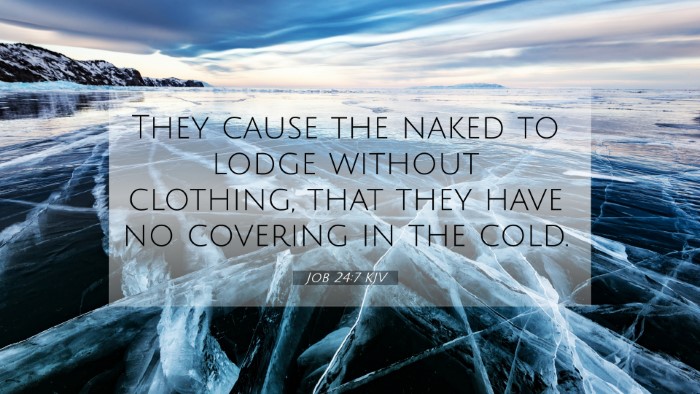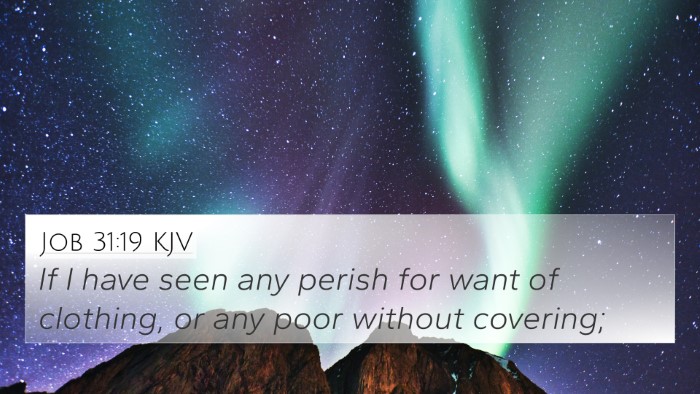Old Testament
Genesis Exodus Leviticus Numbers Deuteronomy Joshua Judges Ruth 1 Samuel 2 Samuel 1 Kings 2 Kings 1 Chronicles 2 Chronicles Ezra Nehemiah Esther Job Psalms Proverbs Ecclesiastes Song of Solomon Isaiah Jeremiah Lamentations Ezekiel Daniel Hosea Joel Amos Obadiah Jonah Micah Nahum Habakkuk Zephaniah Haggai Zechariah MalachiJob 24:7 Similar Verses
Job 24:7 Cross References
They cause the naked to lodge without clothing, that they have no covering in the cold.
Uncover the Rich Themes and Topics of This Bible Verse
Listed below are the Bible themes associated with Job 24:7. We invite you to explore each theme to gain deeper insights into the Scriptures.
Job 24:7 Cross Reference Verses
This section features a detailed cross-reference designed to enrich your understanding of the Scriptures. Below, you will find carefully selected verses that echo the themes and teachings related to Job 24:7 KJV. Click on any image to explore detailed analyses of related Bible verses and uncover deeper theological insights.
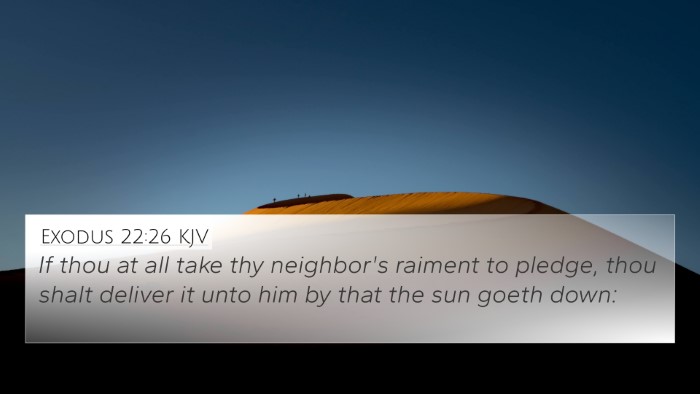
Exodus 22:26 (KJV) »
If thou at all take thy neighbor's raiment to pledge, thou shalt deliver it unto him by that the sun goeth down:

Job 22:6 (KJV) »
For thou hast taken a pledge from thy brother for nought, and stripped the naked of their clothing.

Deuteronomy 24:11 (KJV) »
Thou shalt stand abroad, and the man to whom thou dost lend shall bring out the pledge abroad unto thee.
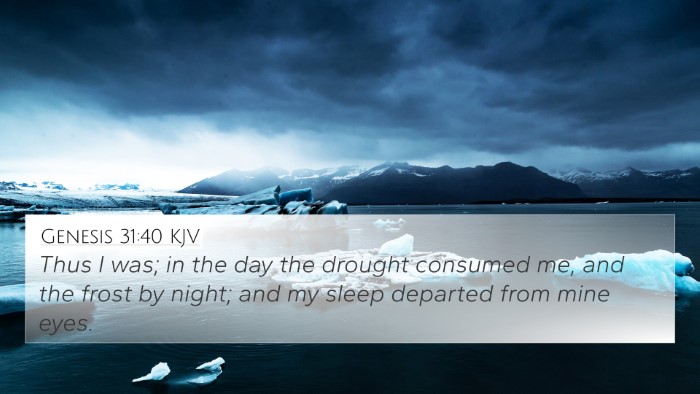
Genesis 31:40 (KJV) »
Thus I was; in the day the drought consumed me, and the frost by night; and my sleep departed from mine eyes.

Job 24:10 (KJV) »
They cause him to go naked without clothing, and they take away the sheaf from the hungry;
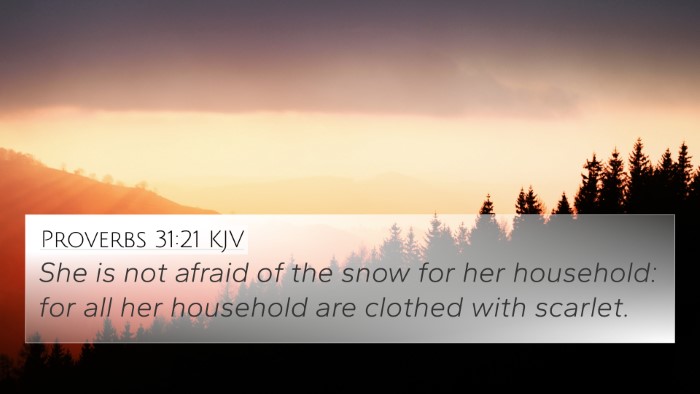
Proverbs 31:21 (KJV) »
She is not afraid of the snow for her household: for all her household are clothed with scarlet.
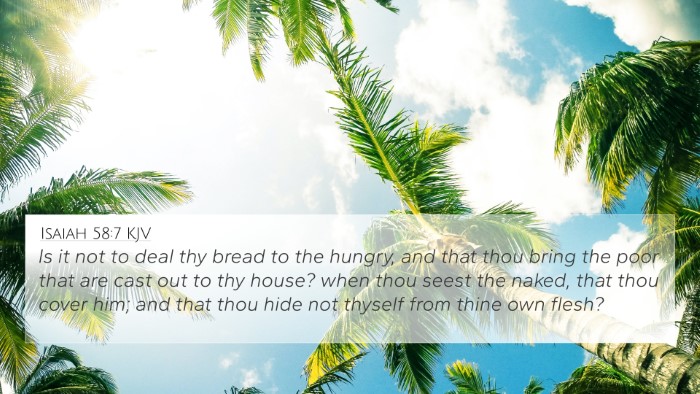
Isaiah 58:7 (KJV) »
Is it not to deal thy bread to the hungry, and that thou bring the poor that are cast out to thy house? when thou seest the naked, that thou cover him; and that thou hide not thyself from thine own flesh?

Acts 9:31 (KJV) »
Then had the churches rest throughout all Judaea and Galilee and Samaria, and were edified; and walking in the fear of the Lord, and in the comfort of the Holy Ghost, were multiplied.
Job 24:7 Verse Analysis and Similar Verses
Understanding Job 24:7
Bible Verse: Job 24:7 - "They cause the naked to lodge without clothing, that they have no covering in the cold."
Summary of Insights from Public Domain Commentaries
Matthew Henry's Commentary
Henry highlights the harsh conditions faced by the poor and oppressed. He notes that the verse reflects on the cruel acts of individuals who deprive others of basic necessities, especially clothing, which is symbolic of decency and protection against the elements. Henry emphasizes the moral implications of such actions, indicating that God sees and judges these injustices.
Albert Barnes' Notes
Barnes draws attention to the stark realities of life for the destitute, providing a vivid image of their suffering. He suggests that the actions described are indicative of a broader societal collapse in morality where the strong exploit the weak. Additionally, Barnes points out that a lack of compassion for the needy is a serious offense in the eyes of God and relates it to the overall theme of divine justice throughout Job.
Adam Clarke's Commentary
Clarke discusses the urgency and desperation of the nakedness mentioned in the verse, which goes beyond mere physical exposure. He connects it to spiritual themes, exploring how such deprivation relates to isolation from God and the community. Clarke poignantly remarks on how these attitudes mirror the heart of sin — neglecting the vulnerable and turning a blind eye to their plight.
Biblical Connections and Cross-References
This verse can be linked to several others throughout the Bible, illustrating interconnected themes of justice and compassion:
- Exodus 22:25-27: A command to care for the poor and ensure they are not oppressed.
- Isaiah 58:7: Instruction to share bread with the hungry and bring the poor into one's home.
- Matthew 25:35: Jesus identifies Himself with the needy, teaching that helping them is akin to serving Him.
- James 2:15-16: A warning against faith that is not accompanied by action, especially toward the needy.
- Proverbs 31:20: A description of the virtuous woman who extends her hand to the poor.
- Lamentations 3:34-36: God does not overlook injustice against individuals.
- Psalms 72:12-14: A prayer for kings to defend the cause of the poor and save them from oppression.
- 1 John 3:17: Warning against having material possessions while ignoring the needs of the brother in need.
- Luke 4:18: Jesus reads from Isaiah, declaring the mission to preach good news to the poor.
- Galatians 6:10: Encouragement to do good to all, especially to fellow believers.
Interpreting Job 24:7 in a Thematic Context
The broader theme of Job is one of suffering and divine justice. Job’s lament reflects both personal anguish and a challenge toward the societal injustices he witnesses. By connecting this verse to others that emphasize care for the vulnerable, one can grasp the weight of ethical responsibility in the face of adversity.
Implications for Bible Study
To explore connections between Bible verses effectively, consider using tools such as a Bible concordance or a Bible cross-reference guide. These resources can enhance your Bible study methods by allowing you to identify connections between Old and New Testament scriptures.
Thematic studies can also be beneficial. For instance, investigating Bible verses that relate to justice can elucidate the concerns highlighted in Job 24:7. This verse serves as a poignant reminder of our obligations to our neighbors, especially those who are vulnerable.
Final Thoughts
Job 24:7 is more than a commentary on human suffering; it serves as a reflection of God’s expectation of justice and compassion among His people. By cross-referencing biblical texts, one gains deeper insight into the moral and spiritual framework of the Scriptures, fostering a more profound understanding of God's word and His wishes for humanity.


